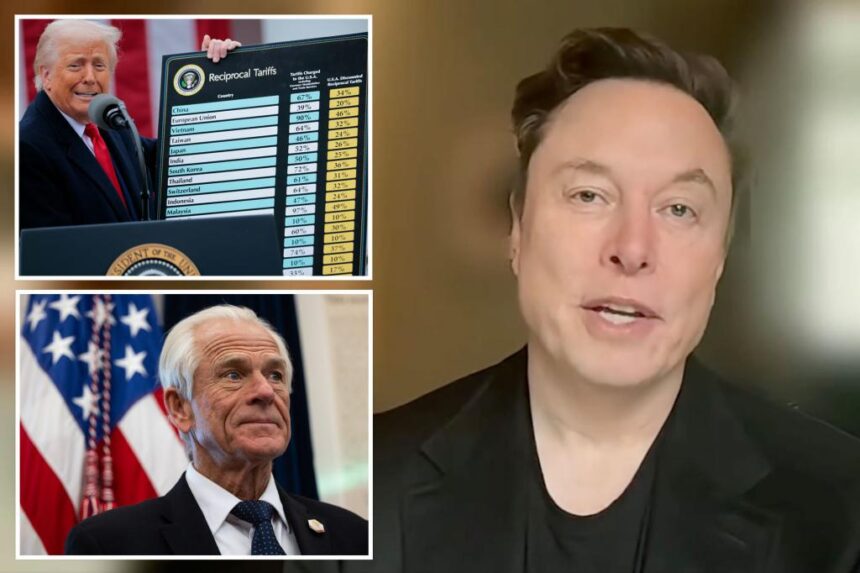Elon Musk, the CEO of Tesla and SpaceX, has recently made headlines for his comments on tariffs imposed by the Trump administration. Musk expressed his hope for a “zero tariff situation” between the US and Europe, distancing himself from the administration’s recent tariff announcements.
President Trump’s decision to implement sweeping tariffs against US trading partners last week led to a significant drop in the stock market, causing an $11 billion loss in Musk’s net worth. Musk took to Twitter to criticize trade adviser Peter Navarro, a key figure behind the tariff regime, stating that a PhD in Econ from Harvard was a “bad thing” due to the ego/brains issue it can create.
Navarro responded to Musk’s comments, suggesting that Musk was simply protecting his business interests, particularly in relation to Tesla’s operations in Texas that rely on parts from Mexico, China, Japan, and Taiwan. Despite the exchange, Navarro downplayed any rift between the two, acknowledging Musk’s influence and the freedom to express opinions.
During a video-link at a congress in Florence, Musk reiterated his support for a zero-tariff trade zone between Europe and North America. He criticized Trump’s tariff announcements, advocating for normal trade relations between the US and Europe. Musk’s statements align with his previous warnings about the negative impact of tariffs on global supply chains, particularly in the automotive industry.
The recent tariffs imposed by Trump have disrupted the stock market, with significant losses across major indices. Musk’s Tesla company, which has substantial business ties with Europe, has faced challenges due to political backlash and competition from China. Despite these setbacks, Musk remains vocal about the importance of predictable tariffs to ensure stability in the supply chain.
Musk’s comments on tariffs and trade policies reflect his ongoing concerns about protectionist measures and the need for a more open and predictable trade environment. As one of the world’s most influential business figures, Musk’s views on tariffs carry weight and contribute to the ongoing debate on trade relations between the US and its global partners. Many companies are considering increasing manufacturing in America, but the process is not something that can happen overnight. This sentiment was expressed by Elon Musk, who has embraced conservative market values and is against protectionism.
In recent years, there has been a push for more manufacturing jobs to be brought back to the United States. This move is seen as a way to boost the economy and create jobs for American workers. However, the logistics of moving manufacturing operations back to the US is not as simple as flipping a switch. Companies need to consider factors such as supply chain management, infrastructure, and workforce availability before making such a move.
Elon Musk, the founder of Tesla and SpaceX, has been vocal about his support for increasing manufacturing in America. However, he acknowledges that this process takes time and cannot be rushed. Musk has embraced traditional conservative market values, which emphasize free trade and competition. He has also been critical of protectionist policies that restrict trade and hinder economic growth.
The White House has been contacted for comment on this issue, but has not yet responded. It is clear that there is a growing interest among companies to bring manufacturing back to the US, but the process will require careful planning and consideration. As the global economy continues to evolve, it will be interesting to see how companies navigate the challenges of increasing manufacturing in America.
In conclusion, while companies may be eager to increase manufacturing in America, it is important to recognize that this process cannot happen overnight. It will require careful planning, coordination, and cooperation between businesses, government agencies, and other stakeholders. By embracing traditional conservative market values and avoiding protectionist policies, companies can work towards creating a more robust and competitive manufacturing sector in the United States. The Great Barrier Reef is one of the most magnificent natural wonders of the world, stretching over 2,300 kilometers along the northeastern coast of Australia. It is not only the largest coral reef system on the planet but also one of the most diverse ecosystems, home to thousands of species of marine life.
The reef is made up of over 2,900 individual reefs and 900 islands, creating a complex and intricate ecosystem that supports a vast array of marine creatures. From colorful coral gardens to majestic whales and playful dolphins, the Great Barrier Reef is a paradise for anyone who loves the ocean.
The reef is not only a beautiful natural wonder but also plays a crucial role in the health of our planet. It acts as a barrier, protecting the coastline from erosion and storm surges, and provides a habitat for countless species of fish, sharks, turtles, and other marine animals. It also supports a thriving tourism industry, bringing in billions of dollars in revenue each year and providing jobs for thousands of people.
However, the Great Barrier Reef is facing numerous threats, including climate change, pollution, and overfishing. Climate change is causing the ocean temperatures to rise, leading to coral bleaching and the death of vast areas of coral. Pollution from agricultural runoff and plastic waste is also harming the reef, while overfishing is depleting fish stocks and disrupting the delicate balance of the ecosystem.
Efforts are being made to protect and preserve the Great Barrier Reef, with organizations and governments working together to reduce greenhouse gas emissions, improve water quality, and establish marine protected areas. Tourism operators are also taking steps to minimize their impact on the reef, such as using sustainable practices and educating visitors about the importance of conservation.
Despite these challenges, the Great Barrier Reef remains a symbol of the beauty and resilience of the natural world. With continued efforts to protect and preserve this incredible ecosystem, we can ensure that future generations will be able to enjoy its wonders for years to come.








